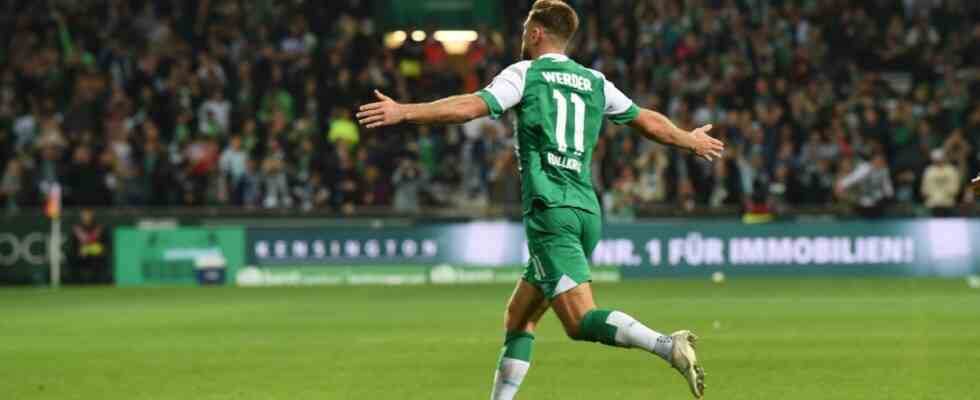Sometimes it makes sense to tell a story from the end, especially in football matches involving SV Werder Bremen. At the very end, the players from the Hanseatic city were lined up like a human chain in front of the fans in the east stand of the Weser Stadium. The spectators in the stands were swaying, the pros were bouncing on the grass, and it looked like those down there had won something big, which those up there really liked. The celebrations were only for a dirty work victory from the machine room of the Bundesliga: The eleventh place before the game had beaten the thirteenth place before the game 1-0. So what?
It certainly couldn’t have been the beauty of the game that brought Bremen out of themselves, but what was it then?
Well, the great joy must have come from the relief that what had started so promisingly for the Bremen Bundesliga returnees this season is not over yet. Bremen had lost three times the week before, were eliminated from the cup and Niclas Füllkrug hadn’t scored once. Although, “I am of the opinion that I scored a legitimate goal in Paderborn,” said Füllkrug, only the video referee saw it differently when the cup was lost against the second division team. Werder’s center forward was there again against the unwieldy Berliners, 85 minutes, 1-0, the decision.
A late goal, a late win, a striker by Füllkrug: The Bremen fans celebrate that their team stands for something again, they are living proof that it’s only over when it’s over. No one can be sure against them that the drops have been sucked, the mass sung and the cheese eaten. Hertha, who were an extremely unpleasant opponent with the intention of minimizing risk, thought they were “well in the game” for the entire 90 minutes, as coach Sandro Schwarz noted. But they couldn’t finally rob the people of Bremen of their belief in themselves.
Werder is the team of late goals
Ole Werner, the coach who instilled this – big word – mentality in Werder, said “it’s worth staying with us” and it’s better not to leave too soon. A game lasts “90 plus”, that’s what Werner repeatedly drummed into his team last season before games. And that she should “stay with herself”, another Ole Werner mantra. Don’t lose your head in the game, not after two wins and not after three losses.
The team seems to understand what the coach says, they are learning. A game similar to that against Hertha was lost against Mainz, said Niclas Füllkrug, “but we analyzed it and did things better this time.” His eleven played grown up, said Werner, and thus forced a completely open game on their side shortly before the end.
Werder have already scored ten goals after the 80th minute this season, and the promoted team has unusual staying power. “We wanted it more,” said Füllkrug, who scored the decisive hit with his head from a good 15 meters out. “World class”, said teammate Milos Veljkovic. “I don’t rank my own goals,” replied Füllkrug, but then said: “Great goal.” It’s already his ninth.
Does Flick call?
Nobody has scored more often this Bundesliga season, and naturally there is no end to speculation as to whether Füllkrug, 29, is not exactly the player who is missing from national coach Hansi Flick’s squad, which is strong but sometimes not very goal-oriented for the upcoming World Cup.
The longer Füllkrug maintains his form towards the departure for Qatar, the more likely it is that Füllkrug could put Werder fans in a big dilemma. The traditionally very political green-white bloc also used banners in the Hertha game to express its reluctance to have football breaks in the authoritarian desert state and recommends simply not watching if the players have to play along: “Boycott” was on the poster. But when your own heart man in the DFB jersey scores the goals?
There hasn’t been a similar identification figure in the Bremen squad for a long time. It wasn’t Max Kruse, he delivered spectacles and goals, but there were always doubts about his loyalty. Theodor Gebre Selassie, on the other hand, was loved precisely because of this loyalty, but the reliable Czech lacked the spectacle in his nine years at Werder.
Füllkrug has a bit of everything, he has survived the most serious injuries as well as epic goal droughts, he committed himself to the club before relegation and endured a coach in the second division who no longer seemed to believe in him. With his goals, he shot the team back into the Bundesliga, from which he had been relegated with them, and, in tandem with the congenial strike partner Marvin Ducksch, gives them an unmistakable asset. And since the beginning of the season he has also been writing his own fairy tale about the World Cup traveler who may have been called up late.
Heroic stories in top-class sport have always arisen from broken biographies. Füllkrug lost 564 days of his career just because of two cartilage damages and a cruciate ligament tear. “Savior” called him now on Friday table football in the title of his report on the game against Hertha BSC. At the bottom, at the top, the filling jug embodies the emotional state of the entire club, which has just suffered; that makes him approachable for the fans.
He knows “which lists he’s on,” said Niclas Füllkrug with almost Buddha-like serenity when asked about his World Cup ambitions, and everything else? Wait. Anyone who knows what surprises and disappointments football has to offer can take their pulse: “Let’s see where this leads.” The whole story can only be told afterwards anyway, from the end.

